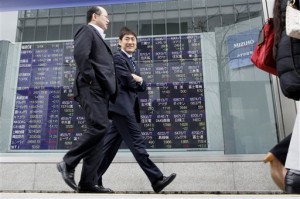Hong Kong, Shanghai down on China target as euro struggles

People walk past the stock prices displayed on an electronic board of a securities firm in Tokyo, Wednesday, March 4, 2015. Hong Kong and Shanghai markets sank in Asian trade Thursday after China set tepid 2015 economic and trade growth targets, while the euro fell to 11-year lows ahead of a key European Central Bank meeting. AP PHOTO/SHUJI KAJIYAMA
HONG KONG–Hong Kong and Shanghai markets sank in Asian trade Thursday after China set tepid 2015 economic and trade growth targets, while the euro fell to 11-year lows ahead of a key European Central Bank meeting.
Wall Street provided a negative lead again despite an upbeat report on the state of the US economy and another round of healthy private-sector jobs growth.
Hong Kong sank 1.11 percent, or 272.43 points, to 24,193.04 and Shanghai lost 0.95 percent, or 31.05 points, to 3,248.48.
Sydney ended flat, edging up 2.57 points to 5,904.16 and Seoul was also virtually unchanged, nudging up 0.09 points to 1,998.38. Tokyo added 0.26 percent, or 48.24 points, to close at 18,751.84.
China’s National People’s Congress, the rubber-stamp legislature, opened with Premier Li Keqiang setting a growth target for this year of “approximately seven percent,” which would be the slowest in 25 years.
The goal, which comes after a 7.4 percent rise in 2014, also comes as authorities look to set the world’s No. 2 economy on a more sustainable path after decades of breakneck growth.
Authorities also cut their trade growth target for this year to “around six percent” after missing its 7.5 percent goal in 2014 for the third consecutive year.
Over the past several months a slew of data has indicated a slowdown in the economy, including on manufacturing, inflation and trade.
In a work report, Li said China had been hit as the global economy faced headwinds, adding: “Downward pressure on China’s economy has continued to mount, and we have faced an array of interwoven difficulties and challenges.”
Traders seemed to be unimpressed with news that China will link up the Shenzhen and Hong Kong stock exchanges on a trial basis as part of its financial sector reform. However, Shenzhen’s composite index rose 0.27 percent, or 4.53 points, to 1,677.77.
The move follows a similar scheme between Hong Kong and Shanghai that started in November. However, while officials trumpeted that as opening up China’s closeted stock markets to the outside world, it was met with tepid demand in both cities.
Dollar-euro parity tipped
Regional investors are also keeping an eye on Europe, where the ECB will outline details of its bond-buying program–known as quantitative easing (QE)–which is aimed at kickstarting the eurozone economy and fending off deflation.
The euro has suffered heavy selling as bank president Mario Draghi prepares to unveil the plan for the 60-billion-euros-a-month scheme.
The single currency fell at one point to $1.1028 Thursday, its lowest level since September 2003, before recovering marginally to $1.1058. That compared with $1.1080 late Wednesday in New York.
It was also at 132.44 yen compared with 132.63 yen in New York and much lower than 133.68 yen earlier Wednesday in Asia.
“The combination of deposit rates negative and QE is a very potent one, so it’s very euro negative,” Robin Brooks, chief currency strategist at Goldman Sachs, told Bloomberg news in Sydney.
“We have in our forecasts a very pronounced euro downswing, which is probably the most dollar-bullish forecast in all of our forecasts.”
He added that the bank saw the dollar-euro reaching parity by the end of next year before the single currency falls further to 90 US cents by the end of 2017.
The dollar fetched 119.83 yen against 119.70 yen in US trade.
US markets ended lower for a second-straight session as dealers brushed off the Federal Reserve report showing the economy expanding moderately while payrolls company ADP said private firms hired more than 200,000 in February.
The Dow fell 0.58 percent, the S&P 500 lost 0.44 percent and the Nasdaq eased 0.26 percent.
On oil markets US benchmark West Texas Intermediate for April delivery was up 12 cents to $51.65 and Brent crude for April down 21 cents at $60.34.
Gold fetched $1,199.90 against $1,204.12 late Wednesday.
In other markets:
— Singapore closed down 0.59 percent, or 20.26 points, at 3,395.27.
OCBC Bank fell 0.48 percent to Sg$10.39 while property firm Keppel Land declined 0.44 percent to Sg$4.52.
— Jakarta closed up 0.05 percent, or 2.89 points, to 5,450.95.
Palm oil producer Astra Agro Lestari rose 1.25 percent to 25,975 rupiah, while car maker Astra International fell 0.32 percent to 7,850 rupiah.
— Kuala Lumpur’s main stock index lost 1.07 percent, or 19.45 points, to close at 1,806.09.
Tenaga Nasional dropped 0.54 percent to 14.64 ringgit, Sime Darby went down 0.21 percent to 9.32 while British American Tobacco rose 1.11 percent to 68.96 ringgit.
— Mumbai rose 0.23 percent, or 68.22 points, to end at 29,448.95 points.
Sun Pharmaceutical Industries rose 3.24 percent to 1,037.35 points, while aluminum major Hindalco Industries fell 3.36 percent to 147.90 rupees.
— Bangkok closed down 0.61 percent, or 9.51 points, to 1,553.33.
Bangchak Petroleum fell 4.48 percent to 32 baht, while Siam Commercial Bank gained 3.24 percent to 175 baht.
— Taipei fell 0.28 percent, or 26.64 points, to 9.595.09.
Taiwan Semiconductor Manufacturing Co. shed 0.33 percent to Tw$150.0 but smartphone maker HTC rose 0.23 percent to Tw$88.5.
— Wellington eased 0.29 percent, or 17.31 points, to 5,8456.77.
Telecom giant Spark was down 1.22 percent at NZ$3.25 and Air New Zealand slipped 0.17 percent to NZ$2.95.
— Manila closed 0.37 percent, or 28.79 points, lower at 7,819.04.